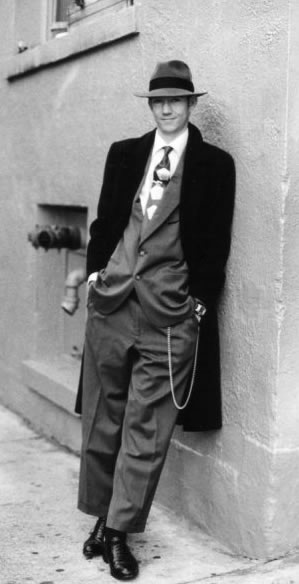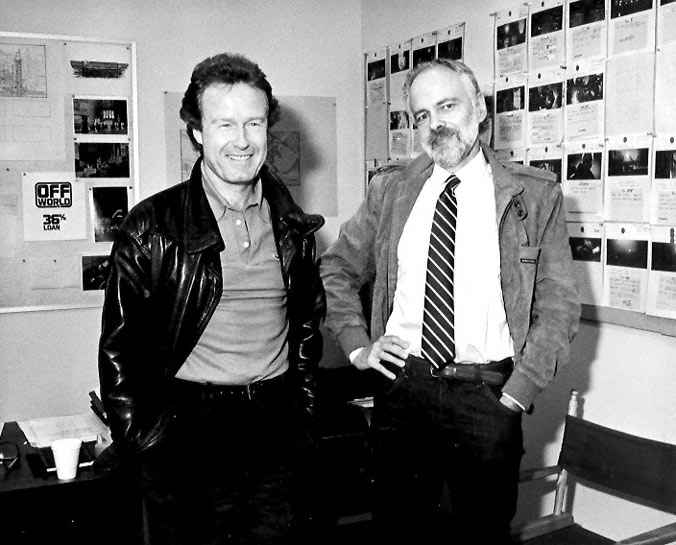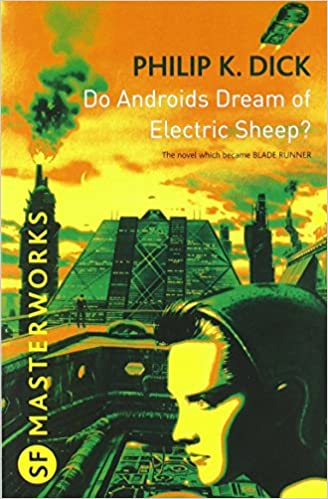
David Gill interview. Published May 17, 2011
I first met Dave Gill in the fall of September 1990. We both worked at a small marketing firm in Chicago where we were responsible for the printing, sorting and mailing of thousands of questionnaires to Sears customers who’d recently received delivery of appliances. At the time, I was a student at DePaul University studying communication (radio, television and film), and I’d just spent the summer on hiatus slumming it at the Mayor’s mansion in Tomales, California, but that’s another story…
Fast forward twenty years to Chicago, late one October night in 2010, when my phone rang: it was the Reglar Wiglar with an assignment to interview Dave for the RW website. The reason; it seems that Dave has become somewhat of an expert on Science Fiction writer Philip K. Dick. In fact he is employed as a Full-time Lecturer in the English/Composition Department at San Francisco State University where he teaches Dick’s classic Do Androids Dream of Electric Sheep? (1968) and where he also completed his Master’s thesis on Dicks and his 1959 novel, Time Out Joint.
Dave is also the publisher and editor of the Total Dickhead blog devoted to all thing Dickian. — Nick Sondy
Click here for David Gills PKD reading recommendations.
RW: State your full name.
DCG: David Colemen Gill.
RW: Where were you born?
DCG: Pasadena, California.
RW: What year?
DCG: 1972.
RW: I heard in one of your lectures, you mentioned that a roommate lent you your first Philip K. Dick book.
DCG: Amy Sammartino. I remember the apartment in Wicker Park (Chicago), I had to be nineteen and Amy loaned me A Scanner Darkly. My reading had been so sheltered—I had only read Isaac Asimov and a little Gregory Benford, like really adolescent Science Fiction. Scanner Darkly had a bunch of stoners and a bunch of technology and it was funny and it had sex in it. It was like seeing your first R-rated movie. I had no idea—
RW: Books could be cool.
DCG: That books could be cool, wow! I don’t remember the next book I read but after moving to Kauii (Hawaii), I must have read twenty of them in about two or three months, and they all bled together which is a very common Dick fan syndrome.
RW: Or any author you immerse yourself in.
DCG: Yeah, anybody who has written that much. In the last few years I’ve really tried to go back and make sure that I know each one fairly well, but there’s fifty-five of them so there’s still a few I haven’t read.
RW: That was my next question, have you read them all?
DCG: I don’t think so. I haven’t read the first book that he wrote that wasn’t published until after he died, Gather Yourself Together, which from what I’ve heard is basically unreadable. There’s probably two or three that have slipped under the radar, but I’ll get to them.
RW: Was that the one that was eventually made into Lies, Inc.?
DCG: No, that’s the Unteleported Man novella. Lies, Inc., I don’t think I ever finished because it’s one of those that wasn’t published until after he died. They had to make it into a novel in his absence and it seems like it’s pretty crummily done. When I read Lies, Inc., I can’t get over the fact that he seems to switch viewpoints right in the middle of the book in a really weird way that kind of broke me when I read it.
RW: He does that in one of his other books too.
DCG: He does it a lot. Do Androids Dream of Electric Sheep? is multiple perspectives—they call it multi foci—but this was in a way that really seemed like a mistake.
There are some scholars who have written fairly extensively about that. I’ll give you a good example, I’m sure I read the Simulacrum but I never really got into it and it was never a favorite of mine and earlier this year I sat down and read it and it just blew my mind. It’s so good. It’s got fifteen or twenty characters in it so it’s a little bit tough to get into at the beginning. Sometimes you’re ready for the book and sometimes you’re not. There’s still some great stuff out there that I look forward to. You have those fans out there who don’t want to read everything by a particular author because then they’re done. My Uncle won’t read his last Hemingway novel.
RW: He’s saving it.
DCG: Like the guy in Lost, he wanted to save that Dickens novel to be the last book he read. So maybe I want to keep one around and have an amazing moment of discovery later on.
RW: I’m looking at a vintage edition of Lies, Inc., and there are thirty-seven (PKD) books listed.
DCG: Interesting. Well, it would always depend on who the publisher was who was listing them. For instance, Unteleported Man was an Ace Double, it was two books back-to-back.
RW: Which wasn’t uncommon.
DCG: Right. And the funny thing is, those publishing houses were so sketchy they would have different numbers of sales for the two titles: “This half of the book we sold 4,000, this half of the book we only sold 3,500.”
RW: And it’s the same volume.
DCG: It’s the same damn book! It’s not possible! That’s sort of the funny thing and it’s also the thing that I find tragic and beautiful—it’s obvious that this guy was toiling in near obscurity. He’s one of these guys—and society’s got so many of them—where their vision is so strong that they’re pursuing it regardless.
It doesn’t matter that Science Fiction is basically the toilet of literary publications, Dick doesn’t care, he’s just dedicated to doing it. The really beautiful thing is, he’s got all that freedom. He’s got all of that space to write and I think he was astute enough to recognize that Science Fiction literatizes the figurative in a way that makes it a really powerful genre for the future.
I really think that Science Fiction is going to be this century’s literary centerpiece because it looks forward in a really interesting way and it allows the author to create a distance that then allows people to see themselves for what they are. If you hold a really tight mirror up to somebody and say, This is what your life is like, doesn’t it suck? They’re going to be like, No, I like my life, this is good and this is good, but if you can create enough distance so that their lives seem vaguely alien to them, they can maybe more accurately say, Oh that is what I’m doing, I am just stuck in this program of a life. Science Fiction allows people to read themselves in a different way.
RW: I think that’s true about art in general.
DCG: There’s something about Science Fiction though that allows Dick to talk about people with poor and empathic responses. He’s able to literalize those people as a metaphor and talk about them as Androids which changes the equation.
In other words, part of what Do Androids Dream of Electric Sheep? is about is civil rights, but you couldn’t really write that book and have it be about Blacks, so it’s about Androids which are clearly the Blacks of the future. Especially in that book where the Androids are operating as slaves on Mars and you can even go to Mars and get a free Civil War plantation with slaves.
So Science Fiction allows Dick to tackle these really hot-button issues but do it in a way that makes it something different for the reader so they’re not necessarily talking about those hot-button issues and yet they are.
RW: Sure.
DCG: And I guess you’re right, I guess that’s what art does, it transposes they keys that something is written in into something that’s a different state. For instance, there’s guys like Thomas Disch who argue that Dick, and a lot of Science Fiction writers with their depictions of post apocalyptic nuclear situations, were actually able to influence the Cold War positively because they were basically saying to the populace, This is what you’re looking at. If the bombs go down, this is the future that you’re talking about and it’s really bad and you don’t want it to happen. Since it’s being depicted in a future fiction it’s easier to wrap your head around.

RW: It’s more palatable to the reader.
DCG: And ultimately, I think it really did do a positive thing with the Cold War. In fact, there’s a chapter in one of Disch’s books, The Dreams Our Stuff is Made Of, where he argues that Dick and others basically disarmed the nuclear bomb because they were so passionate in talking about what that would be like. Do Androids Dream of Electric Sheep? is a good example of that.
RW: It’s interesting, when I was doing the research for this interview and looking at the official (PhilipKDick.com) website and they were talking about the film, Deckard’s assignment is to kill the Replicants and they capitalize it with an R, so I grabbed my copy of the book and I couldn’t remember if it was capitalized in the book and I was looking in the book and I couldn’t find the word Replicant.
DCG: Right, because Dick called them Androids.
RW: So how did that get in there?
DCG: Well, that’s obviously Ridley Scott’s working, or one of the screenwriters, and I think what they were doing is they were being careful to suggest that these weren’t mechanical men. In other words, it’s not the Tin Man running around that Deckard’s after. They’re basically cloned people to some degree. They have blood. They have organs. You can’t even cut into their hands and tell if they’re an Android.
I have that question a lot from students, “What are these guys, robots?” Not really robots, more like clones. I think that was part of the idea of changing that. If you want to talk about what they really did in that movie was they inverted the moral. In that movie Ridley Scott wanted to talk about how great Androids could be. Dick wanted to talk about how crummy humans could be, so they’re basically two different narratives.
I don’t blame Ridley Scott for doing his own take on the book and I don’t even blame him for inverting the moral, I mean, that’s a nice take on it.
The best Dick adaptations are the ones that aren’t actually Dick books. The Truman Show is better than if they would have tried to make a movie out of Time Out of Joint. Or eXistenZ, the Cronenberg movie, that’s probably the best Phil Dick adaptation that Phil Dick never wrote. Then there’s that movie The Thirteenth Floor and there’s Dark City—there’s been a bunch of movies that are really close to Dick’s ideas but they don’t lift the whole thing.
RW: Which just speaks to his genius.
DCG: Yeah, and then you look at something like Minority Report where they took a six page story and made a movie out of it. They had to graft so much crap into the story to make it a movie that it’s not really Dicks’ vision at all. The only movies that are Dick’s vision are A Scanner Darkly, and Radio Free Albemuth that’s looking for distribution right now. I did a little bit of work on that one. Those feel like the real deal. They’re true to the plot, they have all the stuff—but you know, the way things are going, I would almost encourage directors and screenwriters and producers just to become familiar with his body of work and write their own.
I mean look at The Matrix, that’s a great movie that Phil Dick didn’t write that couldn’t have been made without his ideas. I almost think if you’re gonna go ahead and make movies just do your own thing, just lift the best themes and leave the stories because the stories, for the most part, are internal monologues.
I kind of think the whole movie thing—it almost makes me laugh after a certain point. They’re basically just trading on his name at this point. The last stuff they put out Next, Paycheck, those were just garbage. I kind of thought Minority Report was garbage. So there’s the danger of putting all these names out there, but at the same time, (PKD’s) daughters seem to know what the really serious texts are.
They know that The Man in the High Castle is serious so they got Ridley Scott to do that as a mini-series for the BBC and they know Ubic is a hardcore book, a serious book, and they got a good director to work on that, so the movies are about half right. They’re a hundred percent right fifty percent of the time.
RW: In line with that, when they were talking about that on the official site, when they were talking about Deckard’s assignment was to kill the Replicants and their crime was wanting to be human, I thought about that and I didn’t really see it that way at all.
DCG: Well, let’s talk about the ways they seem human-like. Roy Baty and Irmgard actually cooperate; they band together to escape Mars and when Deckard kills Irmgard, Roy Baty lets out a cry of anguish, so they are human-like. They have human emotions. My favorite is the idea of empathy as depicted by Rachel who is this incredibly dangerous character who is empathetic to the extent of saying, What can I do that’s gonna screw you over they most?
RW: In preparation for this, I reread the book and I’d forgotten about the part where Rachel pushed the sheep off of the building.
DCG: The goat, yeah.
RW: The goat. That’s really important but it’s not in the movie at all. That’s really important and I didn’t see that coming.
DCG: It seems like a minor thing but it is incredibly important because it suggests that she is very human. She’s able to feel betrayal—
RW: That powerfully. That she would do something that drastic—
DCG: And the only reason that is drastic is because she was able to get into Deckard’s head and figure it out.
RW: Which is a very human characteristic too.
DCG: Would he have cared if she threw Iran (Deckards’ wife) off the roof. I don’t think so.
RW: Yeah, the one thing, this is the thing that he purchased with money from retiring the other Androids and the only way she’s even capable of that—the one defining feature is all these sick things they can do to animals.
DCG: For instance, the spider, which is another really important scene in the book where they’re cutting the legs off the spider…
RW: And it pisses off Isodore.
DCG: Yeah, it breaks him, but that’s not done out of malice, that’s done out of curiosity: ‘Why does he need all these legs? Let’s see him walk with four legs.’
RW: Almost like a child might do that.
DCG: Yeah, you pour salt on a snail when you’re a kid.
RW: Or a magnifying glass to the ant hill.
DCG: In Dick’s biography they talk about when he was a kid he pinned a bug down with a safety pin and had what they call a satori moment where you realize, ‘Oh my God, I’m inflicting suffering, I can’t do that, it’s morally wrong.’ You recognize the suffering of others, but the Androids can’t recognize that with the spider, and when it comes to the goat what Rachel thinks about is how that’s going to hurt Deckard, not how how it’s going to hurt the goat. And you could say, are these Androids dangerous if no one’s coming after them?
RW: There you’re getting to my next point, if they’re only crime is being human, using what the official site says about the movie, it eludes the fact that they’re potentially dangerous which is essentially the sense that I got from the book and the movie, that these things are dangerous: we can’t have them running around so they have to be retired. I never thought, ‘Is being human a crime?’. That’s not why there’s a bounty hunter going after them.
DCG: That’s just a crap noir throw-away line.
RW: Kind of sensationalist.
DCG: That’s just bullshit. If there is a crime committed it’s a desire to step out of the role prescribed to them by society.
RW: Or what they were designed to do. They’re not designed to do theses things; banding together and escaping a planet.
DCG: Exactly. When Dick talks about what is human, one of the things he says is humans are unpredictable. If you make a machine that’s unpredictable, it’s no good as a machine, so one of the things that separates us is that we’re way less predictable than them because were not made with a singular purpose the way machines are.
One of the things that’s interesting, especially about the movie, if you get the briefcase set and you watch all the DVD extras, they’ve got this really long documentary abut making the movie and they actually shot nude sex scenes with Rachel and Deckard where you see Harrison Ford putting Sean Young—she’s like topless and wearing these weird futuristic panties—on a counter and they’re making out and what they’re saying as they’re showing this is that it just felt really wrong.
When you’re watching it, it’s like your eyeballs want to crawl into your head. And Sean Young is beautiful, who wouldn’t want to see her naked, but there’s something really wrong, just erie, creepy, can’t-put-your-finger-on-it but that is not something I should be watching right now. One of the things I think that says is that the movie got to something too. The movie has it’s own truth and it may be slightly different but it’s no less valid.
RW: About a year ago there was a conversation, I was at a party or something, and the topic of the book came up and we were talking about the whole concept of, Is Deckard an Android? I had never read it that way, I had never watched the movie that way. It just never occurred to me and this really lively discussion ensued and I was reminded of the title of the book and I had to accept it as a potential interpretation.
DCG: Of the book I would disagree with you. I don’t think it’s a potential interpretation of the book.
RW: You don’t think he wrote it that way.
DCG: I think it’s important that he reads as an Android but it’s very important that he’s human, because the point that Dick is making in the book that’s so important is that human beings acts as Androids. That’s the thing about Deckard.
RW: They’re similar, but let me ask you this, do you think at any point Dick wrote it wanting that as a potential interpretation?
DCG: I think he wanted people to wonder about it, but it’s really important that he’s human. For instance, when he gets up in the morning and he programs himself with his Penfield mood organ—
RW: I just sort of looked at that as a vision of the future and a comment on society in general.
DCG: Well the thing I show my students, you look at the very beginning of the book, you turn to page four and Deckard is talking about the mood organ and he says, “Forget what you’ve scheduled and I’ll forget what I’ve scheduled; we’ll dial a 104 together and both experience it, and then you stay in it while I reset mine for my usual businesslike attitude.” and he’s says “that way I’ll want to hop up to the roof and check out the sheep.” Now if you listen to my lectures you know that’s the line that basically stops me cold in my tracks. It’s not that Deckard is programming himself so he’ll be sure to do something, more so that he’s programming himself to want.
RW: He’s enticing an emotion.
DCG: Exactly, and the brilliant thing that Dick does is that he begins and ends the novel with the Penfield mood organ and in the end Deckard doesn’t need it to go to sleep. You see the way that Deckard has transcended that identity to move past that need to be programmed. He’s gone past having his moral agency needing to be defined and determined by society.
Society says Androids are immoral therefore you kill androids. He’s changed that and now he recognizes; No, that ‘s not necessarily morally correct, that’s just what they’re telling me. So he moves from having a moral agency that’s defined by society to having moral agency that comes from himself and this fits with all of the existential psychologists that Dick was reading, mostly Ludwig Binswanger which is where that notion of the tomb world that comes up over and over again with Isidore, that’s all part of that.
So there’s really a beautiful way in which he gets out of that nasty trap. You can think about this anyway, like when you’re a kid and your parents tell you something and you go, Ok it’s wrong to do that because of why they said and you don’t do it because they said not to but that’s not really a moral view that’s a rule-based view.
RW: Right, because of the consequences, you haven’t internalized the right and wrong.
DCG: Exactly. He hadn’t internalized that the action has some moral quality to it and that’s what you have to look at. You have to look at what’s driving the action. It’s really nice that Deckard was able to escape that programing but you look at how his character acts throughout the book; everything he does is predicated by making that money. He’s just constantly going on and on about money.
RW: That’s seems to be on his mind a lot.
DCG: That’s his programming, he wants to get an animal but he doesn’t want to have an animal like a cat in they way that you or I might want to have a cat for companionship and for cuddling and for petting, he wants that animal on his roof to show his neighbors.
RW: A status symbol.
DCG: Yeah, a status symbol, and Dick said that was one of the reasons he really liked this book. You can really see a kind of crappy humanness to Deckard which I think is more important to acknowledge that human beings can feel that way.
I talk about this in the lecture too, when Dick was writing The Man in the High Castle, he did a bunch of research and he read these journals including this guy who was an officer at a concentration camp and the officer wrote in that journal, ‘I can’t sleep at night, the babies are screaming’ and that’s the lowest human beings can go, they can be that apathetic about human life all around them.
So to some degree when people start going, ‘Is Deckard an Android or not?’ it’s like what’s the big deal? Who cares? What difference does it make? Would he be any different if he were one or the other? I’m not exactly sure that he would.
RW: Well, ultimately I think writers think about stuff like that and potential interpretations and in their own mind they’re going to write it in a way—even if they’re ambiguous and misleading on purpose at times—at the end of the day in their own mind they know. It’s one or the other.
DCG: I think he wrote it so you’d wonder.
RW: I agree, that you’d consider it, but then he covers it though. He (Deckard) doesn’t actually undergo the test at any point in the book but he has. At one point he took it.
DCG: And of course that could be an implanted memory, but again, it’s really important to see that this is something that could happen to us; that we could be behaving this way, so it would actually be a cop out—like a get out of jail free card, ‘Oh he’s an asshole, but that’s because he’s an Android.’ It wouldn’t have any heft if it was about how mean these Androids could be. That’s just not that interesting.
RW: Then you’d just have a shoot-’em-up.
DCG: And here, you have the way in which thinking about Androids as the “others” fucks up Deckard’s thinking. Iit really fucks him up as a person and I think one of the interesting things about going to that other police station is that it’s introducing this element of uncertainty. The other reason it’s important to see that police station is so that Deckard can realize that, although his moral authority comes from the infrastructure of society, in other words the police station, his boss, his paycheck, his license, his gun, his uniform–he needs to realize that all of that could be fake. He needs to realize that all the moral authority that he’s carrying around could be counterfeit.
RW: And he considers it.
DCG: He does. He absolutely does. Now to me it’s not even arguable, it’s pretty clear he is an Android in the movie, because his eyes glow in this particular scene and because–my favorite scene is when Baty says through the wall, ‘Deckard, show me what you’re made of’ and what you see is the gun in Deckard’s hand.
So there’s a bunch of evidence there and my understanding is that Dick and Ridley Scott kind of had it out, like they sat down and Dick said, I don’t want you to do it this way, and Ridley said, no, no, no, you gotta let me do it, you don’t have any say in it and (Scott) won.
RW: Well, there’s that photograph on the official site of Ridley Scott and Dick and I was laughing out loud when I saw that because that whole pose, the way he’s standing, it’s so clear he’s Deckard.
DCG: If you really want to go break your brain, go to the Philip K. Dick website and look at a couple different covers of Clans of the Alphane Moon, they Blue Jay edition of that has Phil Dick on the cover painted from that picture with Ridely Scott and he’s standing amid all these aliens from the book.
DCG: My buddy Eric Davis pointed this out in, basically the first serious article about Dick that appeared in the Village Voice. He said, one of the reasons you see Dick on the cover of some of these books is because you understand that at the end of the day, it’s about his (Dick’s) tortured psyche his tortured existence, his struggles.
Where you see that in Do Androids Dream of Electric Sheep is that Dick is clearly Isidore. He’s got poor social skills, he’s an agoraphobic stutterer, which is what Dick is. Then if you remember it’s Hannibal Sloat, his boss at the veterinary center, who says, ‘Isiodore you’re gonna call this lady and you’re gonna tell her her cat died,’ and he says, ‘I can’t do that,’ and he says, ‘No, you’re gonna do it.’
When you study Dick’s life you find out that he felt the same way. He felt really shy but he had this incredible knowledge of classical music and when he started working at University Music—which is still around with a different name—the boss said, ‘You’re gonna work the counter, you’re gonna sell these records.” And Dick said, ‘Oh no, I couldn’t do that,’ and his boss said. ‘Nope, you’re gonna do it.’
That pushed Dick into socializing. He met his first wife a few weeks after that. He bedded her and they had to get engaged and got married. Dick was a mentee, he didn’t have a father figure so he had these guys that really were important to him and these characters are important in this book. He was looking for a father figure, so these characters are important and that’s where Dick is in this book. You could say he’s Decker and yeah he is, but that’s not how he saw himself.
RW: What I was getting at with my next question, I was thinking of what you thought about, as a potential interpretation: what if every one of the Androids that Decker retires—who could they possibly represent in his life?
DCG: Well, it’s pretty obvious to me that Iran is Nancy, his wife at the time he was writing the book. She was having mental problems, whether they’re still ongoing or not I don’t know, but around the time he was writing that book, I get the sense that she was very much like Iran—who I actually like because she doesn’t want to use the mood organ.
RW: You mean you like the character in the book?
DCG: Yeah, because the world sucks and everybody else is saying, Iran, you need to program yourself to be happy and she’s like, I don’t want to be happy, the world sucks. That’s the person I want on my team, the person who—
RW: —Sees it for what it is.
DCG: Exactly! Instead of plastering a big smile on their face and saying, nothing wrong here.
RW: Interesting.
DCG: You know I haven’t thought about it enough to figure out if those are characters from his life. Roy Baty I know is based on Ray Nelson who was Dick’s buddy in Berkeley who claims to have invented the propeller beanie and wrote the story for They Live which is an amazing John Carpenter movie. Ray Nelson and his wife are Roy Batty and Irmgard, those are the models for that, but I’ve never gotten more specific than that in terms of who those characters represent.
RW: Well, Dave you’re well on your way to becoming one of the foremost Phillip K. Dick scholars.
DCG: Workin’ on it. Did you see the New York Times story?
RW: Yes I did.
DCG: They won’t link to Total Dickhead, they won’t even say the name, man. That’s crazy to me.
RW: Well, New York Times… it’s a family magazine.
DCG: (laughs) Yeah.
RW: Well, you run the risk of ‘My fourteen year old son reads science fiction and he Googled the word dickhead.’
DCG: The funny thing is, about half the traffic to my blog comes from Google searches of ‘dickhead pics’ or ‘purple dickhead pics,’ so that’s definitely at play. I remember teaching a class, and before I even recognized what I said, I said, “The reason I liked Dick so much as a teenager is”…. you know, you gotta be careful what comes out of your mouth.
RW: (laughs)
DCG: I sent you a link to that Rickels book?
RW: Oh my god, I was howling with laughter at that.
DCG: It goes on for five hundred pages.
RW: I couldn’t believe it got published.
DCG: It’s amazing. I have to review it for Science Fiction Studies by March so I’ve got to figure out what’s going on.
RW: What the hell? I don’t know how it has any place in academic literature.
DCG: Well, Rickels is a badass. He’s the Professor of German and Comparative Literature at UC Santa Barbara and the Sigmund Freud Professor of Media and Philosophy at the European Graduate School and he’s studied at Harvard and the Sorbonne, I mean, he’s a total badass and the book has a lot of important insight, but shit man you gotta read each paragraph, literally, eight times!
That’s what I’m working on now and I’ve been working on the exegesis a little bit. I couldn’t do the transcription, they needed people to copy down this crazy handwriting and without them paying me I just couldn’t do it, but it looks like I’m going to be annotating some of those and that’s a dream come true.
It’s really bizarre, just to give you a little background on how I ended up doing this, when I finished my Master’s degree, I really wanted to go on and get a Phd and I talked to my mentor here, Geoffrey Green who I really love, and he said, it’s gonna take you ten years from your Master’s to your Phd, it’s gonna cost a hundred and ten thousand dollars and you have a one in ten chance of getting a better job than you have now.
So I said, what do I do? And he said, be a scholar. So actually it goes back to Hog Lady (Sondy’s and Gill’s early 90s noise rock band in Chicago-ed), you go out there and do it and if people like it cool and if they don’t, they don’t. You don’t expect to get paid from it, you don’t expect to get famous from it—you hope you do—but you do it because you love it and because it’s what you’re dedicated to. The blog was just born out of that. The real lucky break was that my buddy Pesco is one of the guys that founded Boing Boing and they’re one of the biggest blogs on the Internet, so as soon as they started linking to my stories I really got name recognition, which is really weird because I haven’t published very much on Dick.
RW: There are a lot of PKD scholars.
DCG: There are and there are more hardcore ones than me, but what they’ve got going against them is, they’re not in the Bay Area, they’re not writing for the general public and they don’t know these people. I know three of the wives, I know friends, I know Tim Powers and I’ve done interviews with all those guys, so I feel like when I write my book—which is coming—it’s not gonna be like Rickels, some bullshit academic nonsense, it’s gonna be a readable, interesting Errol Morris take on Phil Dick.
RW: It will still have value in the academic—
DCG: Yeah, and as a writing teacher I really feel strongly that you have to consider the audience and write to serve them and not to impress them. Rickels breaks all those rules.
RW: That’s a different gig.
DCG: What I get from that is, it’s like the Bible. Part of the Bible is just studying it and figuring out how it works. The road is the journey. It’s part of Rickels’ thing, but it’d be better if it were clearly written. There are a lot of people who have written stuff on Dick but there’s not one that’s fully bridged the academic world and the Phillip K. Dick fandom world and that’s really where I’m looking to be. Especially as (Dick) turns the corner and is headed into the stratosphere. (Dick) really nailed it, and where you see that is from Do Androids Dream of Electric Sheep is, no, that’s not our world yet. There are sure a lot of people who act like Deckard out there.
There sure are a lot of people who chase money without thinking about the moral implications of their actions and there sure are a lot of people taking Prozac and Paxil as a mood organ. He was able to tap into that. I think Dick’s real genius was to note that schizophrenia and really getting into technology are pretty much indistinguishable. If you withdraw from the world into your iPod or into your cell phone, you’re taking yourself out of this world and that’s what Dick is constantly warning us against. There’s something about maintaining our humanity amidst all these machines that’s really important.
Dick asks, what is real is what you perceive when you care about the world around you and what is human is the condition that puts you in a position to see reality and these are important tips. That’s what I want to get to. It’s not about Dick’s notion of Freudian thought or any of that. It’s like he’s given us a guidebook on how to operate in this century and how to stay sane and how to stay centered and how to stay positive, even though those aren’t characteristics that are used to describe his work or him. Something comes out of that when he goes over to the dark side. He’s suffering from his mental illness, which is a disease that he suffers from rather than some pool of great inspiration that he takes from. He can tell us what that’s all about. It’s good stuff.
THE END
Thank you for reading this David Gill Interview. Read more reviews here.
Read more Philip K. Dick
Reading Suggestions From Total Dick-Head David Gill:
For the uninitiated:

Do Androids Dream of Electric Sheep? is a good place to start. This is probably Philip K. Dick’s most carefully constructed examination of what it means to be human. The dystopian future replete with retro noir touches is an early pre-cursor for the Cyberpunk movement and the novel displays many of PKD’s thematic preoccupations.
If you’ve already read a little PKD:

The Three Stigmata of Palmer Eldritch is one of Dick’s wildest rides. Depressed Martian colonists, Perky Pat dolls, hallucinogenic drugs made from extra-terrestrial lichen, Mad Men-style advertising agencies, and the ultimate battle between good and evil.
For the experienced:

VALIS is, for the most part, a non-science fiction novel chronicling Dick’s encounter with the Divine after oral surgery in 1974. An ontological whodunit, stoner X-Files, adventure written late in Dick’s career. Brilliant for both its cosmic speculation and touching depiction of madness.

